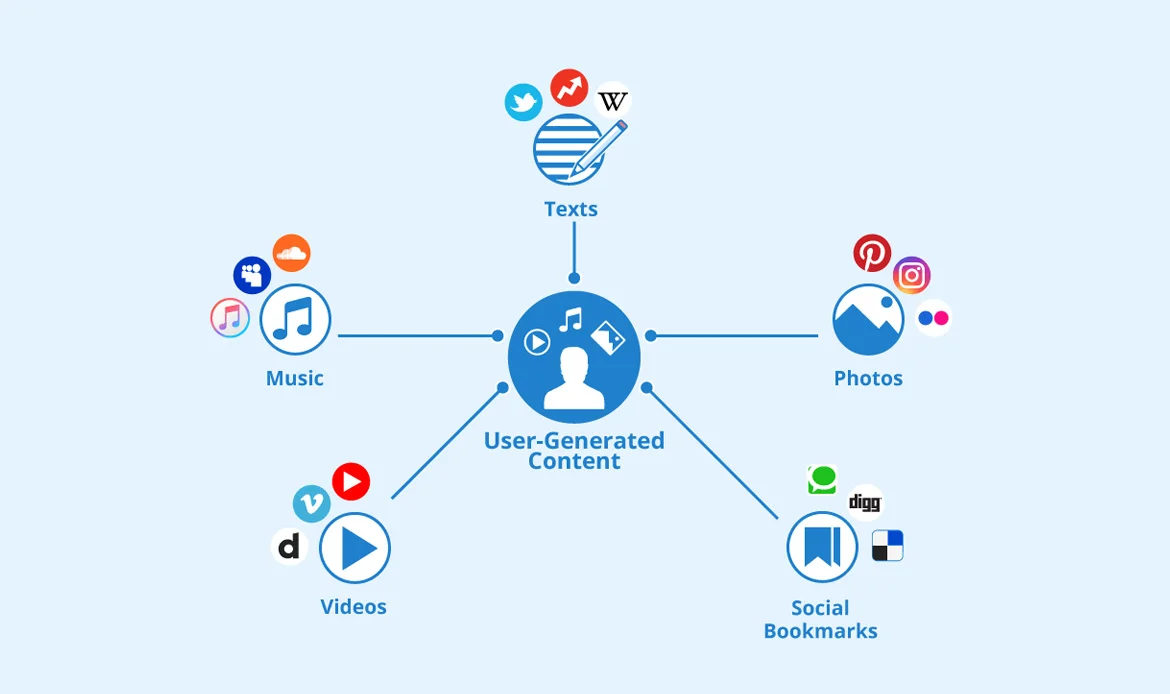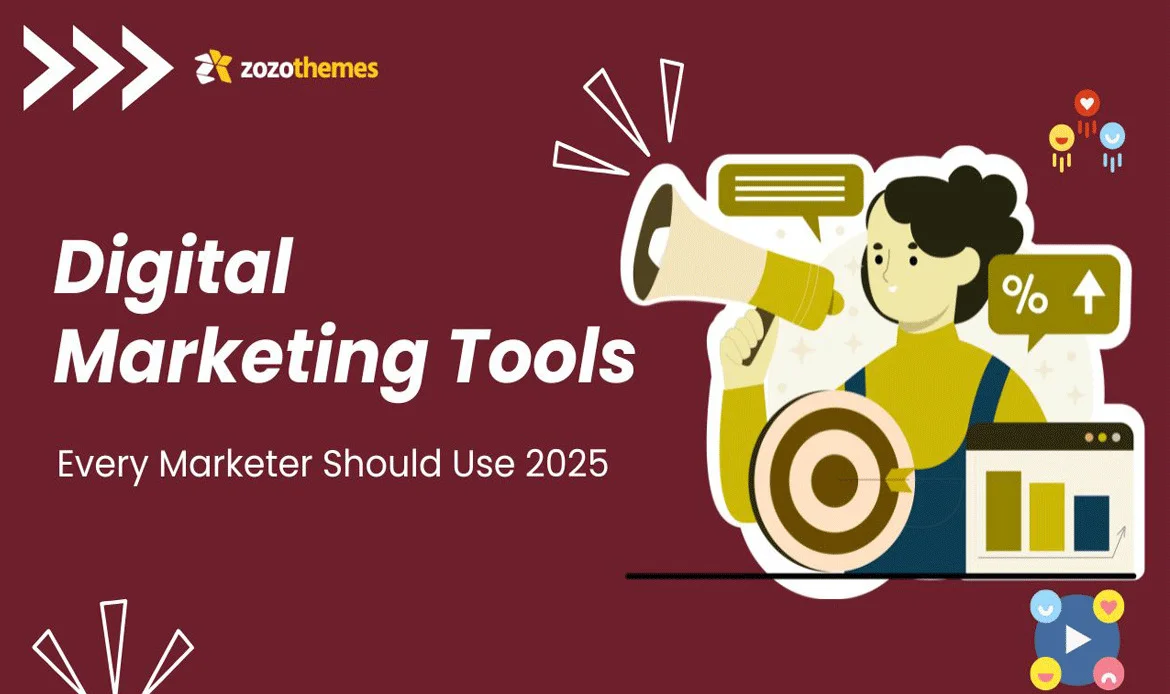Must-Have Digital Marketing Tools for Marketers in 2025
1. AI-Powered Marketing Automation Platforms
 As artificial intelligence (AI) continues to revolutionize the marketing landscape, AI-powered marketing automation platforms have become indispensable for businesses of all sizes.
As artificial intelligence (AI) continues to revolutionize the marketing landscape, AI-powered marketing automation platforms have become indispensable for businesses of all sizes.
Key Benefits of Digital Marketing Tools
- Advanced Machine Learning Algorithms: These platforms utilize sophisticated algorithms to analyze vast amounts of data and optimize marketing campaigns in real-time.
- Predictive Analytics: AI-driven predictive analytics provide valuable insights into consumer behavior, enabling marketers to anticipate needs and tailor their strategies accordingly.
- Personalization Capabilities: By leveraging AI, these platforms offer highly personalized experiences for customers, driving engagement and conversions.
- Automated Campaign Management: From email marketing to social media advertising, AI-powered automation streamlines campaign management processes, saving time and resources.
2. Social Media Management Suites
With social media continuing to play a pivotal role in digital marketing strategies, comprehensive social media management suites have become indispensable for businesses seeking to harness the power of social platforms.Core Advantages of Digital Marketing Tools
- Multi-Platform Management: These suites support management across multiple social media channels, allowing marketers to streamline content publishing, scheduling, and monitoring.
- Advanced Analytics: Robust analytics capabilities provide valuable insights into social media performance, audience demographics, and engagement metrics, empowering marketers to optimize their strategies.
- Content Curation and Suggestion: AI-driven content curation features help marketers discover relevant content, trends, and hashtags, facilitating content creation and distribution.
- Social Listening: By monitoring conversations and mentions across social media platforms, these suites enable businesses to gain valuable feedback, identify brand sentiments, and address customer concerns in real-time.
3. Chatbots and Conversational Marketing Tools
 In an era where customer engagement is key, chatbots and conversational marketing tools have emerged as essential assets for businesses looking to enhance their online interactions.
In an era where customer engagement is key, chatbots and conversational marketing tools have emerged as essential assets for businesses looking to enhance their online interactions.
Essential Highlights of Digital Marketing Tools
- Natural Language Processing (NLP): Advanced NLP technology enables chatbots to understand and respond to customer inquiries in a conversational manner, mimicking human interactions.
- 24/7 Customer Support: Chatbots provide round-the-clock support, resolving queries and guiding users through various stages of the customer journey.
- Lead Qualification: Through intelligent lead qualification processes, chatbots help identify high-potential leads and route them to the appropriate sales channels.
- Integration with Messaging Platforms: These tools seamlessly integrate with popular messaging platforms such as Facebook Messenger and WhatsApp, enabling businesses to engage customers where they are.
4. Video Marketing Platforms
As video content continues to dominate the digital landscape, video marketing platforms have emerged as essential tools for businesses looking to captivate audiences and drive engagement.Powerful Capabilities of Digital Marketing Tools
- Video Editing and Customization: These platforms offer intuitive video editing tools, enabling marketers to create professional-quality videos with ease.
- Interactive Elements: From clickable CTAs to interactive polls, these platforms allow marketers to enhance viewer engagement and drive action within their videos.
- Analytics and Performance Tracking: Comprehensive analytics dashboards provide insights into video performance metrics such as views, watch time, and engagement rates, empowering marketers to refine their strategies.
- Integration with Social Platforms: Seamless integration with social media platforms enables marketers to distribute videos across various channels and maximize their reach.
5. Email Marketing Platforms
 Despite the emergence of new communication channels, email marketing remains a cornerstone of digital marketing strategies. Email marketing platforms in 2025 offer advanced features to help businesses effectively engage their subscribers and drive conversions.
Despite the emergence of new communication channels, email marketing remains a cornerstone of digital marketing strategies. Email marketing platforms in 2025 offer advanced features to help businesses effectively engage their subscribers and drive conversions.
Unique Strengths of Digital Marketing Tools
- Personalization and Segmentation: Advanced segmentation capabilities enable marketers to create highly targeted email campaigns based on user demographics, behaviors, and preferences.
- Automated Workflows: These platforms allow for the creation of automated email workflows, including welcome sequences, abandoned cart reminders, and personalized follow-ups, to nurture leads and guide them through the sales funnel.
- A/B Testing: Robust A/B testing functionality enables marketers to optimize email subject lines, content, and CTAs to maximize open rates, click-through rates, and conversions.
- Integration with CRM Systems: Seamless integration with customer relationship management (CRM) systems enables marketers to synchronize customer data and track interactions across multiple touchpoints.
6. Search Engine Optimization (SEO) Tools
Search Engine Optimization (SEO) Tools are essential digital marketing tools that help businesses improve their online visibility and ranking on search engines. From keyword research and on-page optimization to backlink tracking and competitor analysis, these tools provide valuable insights that guide marketers in creating content strategies that drive traffic.Must-Know Essentials of Digital Marketing Tools
- Keyword Research and Analysis: Comprehensive keyword research tools enable marketers to identify relevant keywords, analyze search volume and competition, and develop data-driven content strategies.
- On-Page Optimization: These tools provide actionable insights and recommendations for optimizing on-page elements such as meta tags, headings, and content to improve search engine rankings.
- Backlink Analysis: Advanced backlink analysis features help marketers identify and analyze inbound links, assess their quality and authority, and develop link-building strategies to enhance website authority and rankings.
- Performance Tracking and Reporting: Robust analytics dashboards offer insights into key SEO metrics such as organic traffic, keyword rankings, and backlink profile, allowing marketers to track progress and measure the effectiveness of their SEO efforts.
7. Influencer Marketing Platforms
 Influencer marketing has emerged as a powerful strategy for brands looking to reach and engage their target audiences authentically. Influencer marketing platforms in 2025 facilitate seamless collaboration between brands and influencers, enabling them to create impactful campaigns.
Influencer marketing has emerged as a powerful strategy for brands looking to reach and engage their target audiences authentically. Influencer marketing platforms in 2025 facilitate seamless collaboration between brands and influencers, enabling them to create impactful campaigns.
Influencer Marketing Platforms Advantages
- Influencer Discovery and Outreach: These platforms feature extensive databases of influencers across various niches and industries, making it easy for brands to discover and connect with relevant influencers.
- Campaign Management: From negotiating contracts to tracking deliverables and measuring ROI, influencer marketing platforms streamline the entire campaign management process, ensuring seamless execution and results tracking.
- Performance Analytics: Comprehensive performance analytics dashboards provide insights into campaign reach, engagement, and conversions, allowing brands to assess the effectiveness of their influencer marketing initiatives and optimize future campaigns.
- Fraud Detection and Compliance: Advanced fraud detection algorithms help identify fake followers, engagement manipulation, and other fraudulent activities, ensuring transparency and integrity in influencer partnerships.
8. Content Management Systems (CMS)
A robust content management system is essential for businesses to create, manage, and optimize their online content effectively. In 2025, CMS platforms offer advanced features to streamline content creation, distribution, and performance tracking.Content Management Systems (CMS) Capabilities
- Intuitive Content Editing: User-friendly interfaces and drag-and-drop editors make it easy for marketers to create and edit content without the need for coding skills, empowering teams to publish content quickly and efficiently.
- Multi-Channel Publishing: CMS platforms support multi-channel publishing, allowing businesses to distribute content across websites, blogs, social media, email newsletters, and other digital channels from a centralized dashboard.
- Content Personalization: Advanced CMS platforms offer dynamic content personalization capabilities, enabling marketers to deliver tailored content experiences based on user preferences, behaviors, and demographics.
- SEO Optimization: Built-in SEO tools and plugins help optimize content for search engines, with features such as metadata optimization, XML sitemap generation, and canonical tags to improve visibility and rankings.
9. Customer Relationship Management (CRM) Software
 CRM software plays a pivotal role in managing customer relationships, driving sales, and enhancing customer experiences. In 2025, CRM platforms offer advanced features to centralize customer data, automate processes, and foster meaningful interactions.
CRM software plays a pivotal role in managing customer relationships, driving sales, and enhancing customer experiences. In 2025, CRM platforms offer advanced features to centralize customer data, automate processes, and foster meaningful interactions.
Customer Relationship Management (CRM) Software Benefits
- Centralized Customer Database: CRM platforms consolidate customer data from multiple sources, including interactions, transactions, and preferences, providing a holistic view of each customer and enabling personalized engagement.
- Sales Automation: Automated workflows and lead scoring functionalities streamline sales processes, from lead generation and qualification to nurturing and conversion, improving efficiency and productivity.
- Marketing Integration: Seamless integration with marketing automation platforms enables bi-directional data sync between CRM and marketing systems, ensuring alignment between sales and marketing efforts and enhancing lead management and conversion.
- Customer Service and Support: Robust customer service features, such as ticketing systems, knowledge bases, and chat support, help businesses deliver exceptional customer support experiences and resolve inquiries promptly.
10. Web Analytics Tools
Web analytics tools are essential for businesses to measure website performance, track user behavior, and optimize digital marketing strategies. In 2025, these tools offer advanced features to provide actionable insights and drive informed decision-making.Web Analytics Tools Highlights
- Real-Time Analytics: Real-time reporting capabilities enable marketers to monitor website traffic, user interactions, and conversions as they happen, allowing for timely adjustments and optimizations.
- User Behavior Tracking: Advanced user behavior tracking features, such as heatmaps, session recordings, and event tracking, provide insights into how users navigate and interact with websites, helping identify pain points and opportunities for improvement.
- Conversion Attribution: Multi-channel attribution models attribute conversions to the various touchpoints and marketing channels that contributed to them, providing visibility into the effectiveness of marketing campaigns and channels.
- Customizable Dashboards and Reports: Flexible dashboard and reporting functionalities allow marketers to customize views, metrics, and reports based on their specific KPIs and objectives, facilitating data-driven decision-making and performance monitoring.
11. Smarter Analytics with Digital Marketing Tools
 Marketing analytics platforms play a crucial role in helping businesses measure the performance of their marketing efforts across various channels and campaigns. In 2025, these platforms offer sophisticated features to track, analyze, and optimize marketing metrics effectively.
Marketing analytics platforms play a crucial role in helping businesses measure the performance of their marketing efforts across various channels and campaigns. In 2025, these platforms offer sophisticated features to track, analyze, and optimize marketing metrics effectively.
Smarter Analytics with Digital Marketing Tools Insights
- Cross-Channel Attribution: Advanced attribution modeling capabilities allow marketers to attribute conversions accurately to the touchpoints and channels that contributed to them, providing insights into the customer journey and campaign effectiveness.
- Predictive Analytics: Predictive modeling and forecasting tools leverage historical data to predict future trends, behaviors, and outcomes, empowering marketers to make data-driven decisions and anticipate market shifts.
- Cohort Analysis: Cohort analysis features enable marketers to segment users based on shared characteristics or behaviors and track their engagement and retention over time, facilitating targeted marketing efforts and customer segmentation.
- Customizable Dashboards and Reports: Robust dashboard and reporting functionalities offer customizable views, metrics, and visualizations, allowing marketers to tailor insights to their specific needs and share actionable insights with stakeholders.
12. Driving Conversions Using Digital Marketing Tools
Conversion rate optimization tools are essential for businesses looking to maximize the effectiveness of their digital marketing efforts and improve website conversions. In 2025, these tools offer advanced features to analyze user behavior, identify optimization opportunities, and A/B test strategies.Driving Conversions Using Digital Marketing Tools Strengths
- Website Heatmaps and Session Recordings: Heatmap and session recording functionalities provide visual insights into how users interact with websites, highlighting areas of interest, engagement, and friction.
- A/B Testing and Experimentation: Robust A/B testing and experimentation tools enable marketers to test different variations of website elements, such as CTAs, forms, and layout, to identify the most effective strategies for driving conversions.
- Personalization and Dynamic Content: Dynamic content personalization features allow businesses to deliver tailored experiences to users based on their preferences, behaviors, and demographics, increasing relevance and engagement.
- Conversion Funnel Analysis: Conversion funnel analysis tools help marketers identify bottlenecks and drop-off points in the customer journey, enabling them to optimize funnel stages and improve conversion rates.
13. Building Trust Through UGC and Digital Marketing Tools
 Social proof and user-generated content have become integral components of digital marketing strategies, as they help build trust, credibility, and authenticity with audiences. In 2025, platforms dedicated to social proof and UGC offer innovative features to leverage customer-generated content effectively.
Social proof and user-generated content have become integral components of digital marketing strategies, as they help build trust, credibility, and authenticity with audiences. In 2025, platforms dedicated to social proof and UGC offer innovative features to leverage customer-generated content effectively.
Building Trust Through UGC and Digital Marketing Tools Essentials
- Content Curation and Moderation: Advanced content curation and moderation tools enable businesses to curate and display user-generated content (UGC) from social media, reviews, and other sources, ensuring quality and relevance.
- Social Proof Widgets: Social proof widgets such as customer reviews, ratings, and testimonials can be embedded on websites and landing pages to showcase positive feedback and influence purchase decisions.
- UGC Campaign Management: These platforms facilitate the creation and management of UGC campaigns, from incentivizing user submissions to tracking performance and measuring ROI, fostering community engagement and brand advocacy.
- Rights Management and Permissions: Built-in rights management features help businesses secure permissions and rights to use user-generated content legally, mitigating the risk of copyright infringement and ensuring compliance with regulations.
14. Listening to Customers with Digital Marketing Tools
Understanding customer preferences, opinions, and satisfaction levels is essential for refining products, services, and marketing strategies. Customer feedback and survey tools offer features to collect, analyze, and act on valuable insights from customers.Building Trust Through UGC and Digital Marketing Tools Essentials
- Survey Design and Customization: Intuitive survey builders enable businesses to create customized surveys with various question types, branching logic, and branding options to gather specific feedback.
- Multichannel Distribution: These tools support distribution across multiple channels, including websites, email, social media, and SMS, maximizing survey reach and response rates.
- Real-Time Feedback Analysis: Advanced analytics dashboards provide real-time insights into survey responses, sentiment analysis, and trends, allowing businesses to identify patterns and areas for improvement promptly.
- Actionable Insights and Reporting: Comprehensive reporting features offer actionable insights and recommendations based on survey data, empowering businesses to make informed decisions and drive continuous improvement.
15. Scaling Ads Effectively via Digital Marketing Tools
 Programmatic advertising has transformed the digital advertising landscape, offering automation, efficiency, and precision targeting. Programmatic advertising platforms provide features to execute, optimize, and measure advertising campaigns across various channels.
Programmatic advertising has transformed the digital advertising landscape, offering automation, efficiency, and precision targeting. Programmatic advertising platforms provide features to execute, optimize, and measure advertising campaigns across various channels.
Listening to Customers with Digital Marketing Tools Key Points
- Automated Ad Buying: These platforms use algorithms and data-driven insights to automate the process of buying and placing ads across digital channels, including display, video, mobile, and social media.
- Audience Targeting and Segmentation: Advanced targeting capabilities enable advertisers to reach specific audiences based on demographics, interests, behaviors, and intent signals, maximizing campaign relevance and effectiveness.
- Real-Time Bidding (RTB): RTB features enable advertisers to bid on ad inventory in real-time, ensuring optimal ad placement and cost efficiency.
- Performance Optimization and Reporting: Robust optimization tools and analytics dashboards provide insights into campaign performance metrics, such as impressions, clicks, conversions, and return on ad spend (ROAS), allowing advertisers to optimize campaigns in real-time.
Digital Marketing Tools Every Marketer Should Use 2025
1. What are the most essential digital marketing tools in 2025?
The must-have tools in 2025 include marketing analytics platforms, CRO (Conversion Rate Optimization) tools, social proof & UGC platforms, customer feedback tools, and programmatic advertising platforms.
2. Why should marketers invest in digital marketing tools?
These tools help businesses track performance, improve conversions, build trust through user-generated content, gather customer insights, and run highly targeted advertising campaigns.
3. What are the most essential digital marketing tools in 2025?
By providing data-driven insights, automating campaigns, and optimizing the customer journey, these tools reduce wasted ad spend and maximize returns.
4. Are digital marketing tools suitable for small businesses?
Yes, many tools offer flexible pricing and scalable features, making them accessible for startups, small businesses, and enterprises alike.
5. Which digital marketing tools are best for customer engagement?
Social proof platforms, UGC tools, and survey/feedback tools are excellent for enhancing customer engagement and building brand loyalty.
Final Thoughts
In the rapidly evolving world of digital marketing, staying ahead requires not only creativity and strategic thinking but also leveraging the right tools and technologies. The digital marketing landscape in 2025 is characterized by innovation, automation, and data-driven decision-making. From AI-powered analytics platforms to influencer marketing tools, the array of options available to marketers is vast and diverse. By incorporating these essential digital marketing tools into their strategies, marketers can streamline processes, analyze data effectively, and engage with their target audience in more meaningful ways.Ready to Elevate Your Marketing in 2025?
Step into the future of digital growth with our marketing-focused WordPress themes, built to help you capture leads, boost conversions, and grow your brand visibility effortlessly. Designed with SEO optimization, speed, and mobile-first design, our themes give your campaigns the edge they need to succeed in 2025’s competitive digital world.


